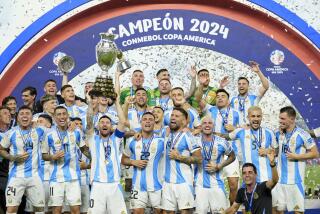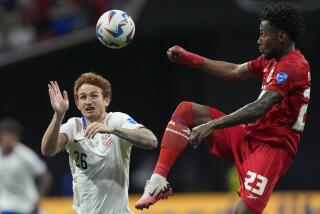Coronation for Argentina, Maradona : Scoreless in Cup Final, He Cuts Off West Germans at Pass, 3-2
- Share via
MEXICO CITY — By the time the skies clouded over and the evening rains came, it was all over. Diego Armando Maradona had finally realized his dream.
The youngster from the slums of Buenos Aires could at last call himself world champion. After years of struggle, years of doubt, he had led his country back to the top.
So, if there were tears in Maradona’s eyes as he was carried off the Azteca Stadium field Sunday afternoon, the solid gold World Cup clasped proudly in his hand, it was only to be expected.
This was the victory that had been denied him in Argentina in 1978 and that eluded him in Spain in 1982.
But Mexico has been different. Mexico has been Maradona’s World Cup from the beginning.
That he failed to score a goal in Sunday’s 3-2 victory over West Germany is not important. His brilliant pass set up the winning goal, and that Argentina won was all that mattered.
It did so in dramatic fashion, building a 2-0 lead, allowing the Germans to tie the score late in the game, and then clinching the championship in the closing minutes.
It was a match of many twists and turns, the unusual being the rule rather than the exception. And, as is to be expected in such cases, it produced its fair share of unlikely heroes.
There was, for instance, Jose Luis Brown, the scorer of Argentina’s first goal, who spent the majority of the second half fighting both the pain of a separated shoulder and the power of the German attack.
There was little Rudi Voeller, the West German striker who came on as a substitute in the second half and who had a hand in both of his team’s goals.
And, finally, there was Jorge Luis Burruchaga, the player who brought every Argentine fan in the crowd of 114,500 to their feet with his game-winning goal just six minutes from the final whistle.
It was, all in all, a satisfying end to a World Cup that has very often failed to live up to expectations. The championship match will not be remembered as a classic, but neither will it be quickly forgotten.
West Germany came in as the underdog, the team that would defend and hope for a lucky goal or two that might result from the counterattack.
Argentina, meanwhile, came in as the favorite. Had Maradona been wearing the green jersey of West Germany rather than the blue and white of Argentina, that probably would not have been the case. Any team including Maradona would have to be favored.
After pondering the move for some time, West German Coach Franz Beckenbauer finally decided to assign midfielder Lothar Matthaeus to mark the Argentine star. It was a shrewd decision, one that proved correct.
Matthaeus shadowed Maradona wherever he went, only abandoning his defensive chore when West Germany had possession. Nor did Matthaeus use especially rough tactics. His tackles were hard but generally clean.
It was somewhat surprising, therefore, when Brazilian referee Romulado Filho cautioned Matthaeus with a yellow card in the 22nd minute for fouling Maradona by bringing him down from behind.
For West Germany, it proved to be a costly error. Seconds later, Argentina had taken the lead.
The goal was partly the result of a skillfully flighted free kick by Burruchaga and partly due to an appalling defensive mistake by West German goalkeeper Harald (Toni) Schumacher.
Taking the free kick to the right of the goal some 20 yards out, Burruchaga sent an high pass floating into the West German goalmouth. The flight of the ball apparently completely fooled Schumacher, who was drawn out of his net to try to snare the ball, then found himself unable to reach it and unable to get back in time.
Stranded in a no-man’s land, he could only watch in dismay as Brown, who had moved up from his defensive position, leaped to head the ball powerfully into the open net.
Had Schumacher stayed on his line, he ought to have been able to make the save. As it was, West Germany trailed, 1-0.
Brown, 28, a largely unknown central defender who has played professionally for clubs in both Argentina and Colombia, celebrated his goal by sprinting to the left corner flag, falling on his knees, and raising his arms to the plaudits of the crowd. It was not a moment he will soon forget.
The remainder of the first half was uneventful, with the closest either team could come to scoring being a free kick by Maradona that Schumacher scrambled to cover in the 27th minute.
Beckenbauer, who spend the entire match standing by the side of his team bench, must have left the field believing West Germany had a chance. His only change in the second half was to bring on Voeller in place of Klaus Allofs, who had been ineffective.
Just six minutes into the second half, Brown crumpled to the ground in the Argentine penalty area, clutching his right shoulder. He was taken off for treatment, but returned very shortly and spent the rest of the match with his right arm in a hastily improvised sling.
That sling consisted of Brown tearing a hole in his jersey and hooking his right thumb into it. It was crude but effective, because he kept playing and playing well.
Argentina seemed able to repulse the West German attack without too much difficulty. Karl-Heinz Rummenigge caused very few problems, and Voeller was still trying to get the feel of the game.
Then, less than 11 minutes into the second half, Argentina struck again.
A fine pass from Hector Enrique set Jorge Valdano free one-on-one against Schumacher, and Valdano calmly stroked the ball past the German goalkeeper as if it were the easiest thing in the world to do.
The goal, Valdano’s fourth in the tournament, caused him to be mobbed by teammates, all the Argentines feeling they had the game won. Beating West Germany is not that simple a proposition, though.
Five minutes after Valdano’s goal, Beckenbauer made his second substitution, bringing Dieter Hoeness on in place of Felix Magath. The latter was not at all pleased, however, and refused to join the German bench, instead going straight to the locker room.
The West German camp has been filled with dissent during this World Cup, however, and seems to thrive on it. As if to demonstrate that, not too long after Magath’s show of petulance, the Germans pulled a goal back and suddenly became the aggressor.
Physically, they began to pound a little harder at the Argentine defense. Rummenigge charged into Brown, who emerged from the collision grimacing in pain but was able, seconds later, to block a strong shot from Hans-Peter Briegel.
With Andreas Brehme, the scorer of the goal that sank France in the semifinals, playing well, and Voeller beginning to find his stride, it was only a matter of time before the Germans scored.
The goal came in the 75th minute. A corner kick from Brehme was headed on by Voeller and fell at Rummenigge’s feet directly in front of the net. His task was easy, and Argentine goalkeeper Nery Pumpido had no chance.
That made it 2-1 with 15 minutes to play and the stage seemed set for a stirring finish.
West Germany kept up its offensive pressure and, to the huge surprise of its fans, tied the game with less than nine minutes to play. This goal, too, came after a corner kick, with Norbert Eder this time heading the ball to Voeller, who headed it home from close range.
The Germans were given little time to celebrate this change of fortune. Exactly 2 1/2 minutes later, Argentina was back in front.
Not unexpectedly, it was Maradona, their captain, who put the Argentines back on the road to victory. Having been effectively contained by the close marking of Matthaeus, Maradona had spent much of the match either drawing attention away from his teammates or setting them up with excellent passes.
This is what he did now. Argentina broke out from defense, Maradona pushed forward a superb through pass that caught the West German defense by surprise and Burruchaga found himself with only Schumacher to beat.
Undaunted by the desperately charging Briegel, who was struggling to make the tackle before the shot was fired, Burruchaga calmly slipped the ball past the diving goalkeeper.
As it caught in the back of the net, a roar went up from the crowd. This time, West Germany could not possibly fight back. It had lost to Italy in the 1982 final and now it was about to lose again.
A few minutes later it was all over. Maradona, who in 1978 had been left off then-Coach Cesar Luis Menotti’s World Cup-winning Argentine team and who in 1982 had been a major disappointment in Spain, finally had his victory.
He had not scored the goal he needed to tie England’s Gary Lineker for the tournament’s individual scoring honors, but what did it matter?
Let Lineker have his moment. Maradona had his World Cup.
More to Read
Go beyond the scoreboard
Get the latest on L.A.'s teams in the daily Sports Report newsletter.
You may occasionally receive promotional content from the Los Angeles Times.






